Jobriath, the forgotten star who could have been the other Bowie: ‘Asking me if I’m homosexual is like asking James Brown if he’s Black’
Fifty years ago, Bruce Wayne Campbell was promoted as the great American glam artist and the first openly gay rock musician. Everyone in the industry predicted that he would be a star. They were wrong


In the summer of 1992, Morrissey decided to hire Jobriath, one of his heroes, as an opening act for the U.S. tour of his third solo album, Your Arsenal. He had been assured that the musician from Pennsylvania was still living in New York, in the pyramid-shaped loft at the top of the famous Chelsea Hotel, and that he would be delighted to participate in a prominent musical event. That he was still writing songs and welcomed the opportunity to publish them whenever he had the chance.
None of that was true. Jobriath (born as Bruce Wayne Campbell in Philadelphia, in 1946) had died nine years earlier, in August 1983, a victim of AIDS before turning 37. Morrisey did not know this because the British music press had not written a single line about it at the time. Not that the American media was any different; the outlets of the day made no particular fuss about the death of a man who had stuck to James Dean’s philosophy (live fast, die young, leave a good-looking corpse) after enjoying, between December 1972 and March 1974, a whirlwind 15-month career as a rock star. Morrisey would end up honoring his idol by incorporating one of Jobriath’s most emblematic songs, Mornig Starship, into his repertoire, and dropping his name in the occasional interview. Marc Almond also wanted to do him a little retrospective justice. But the world at large had forgotten about him, and this would remain unchanged until well into the 21st century, with the arrival of nostalgic ammunition of such heavy caliber as Kieran Turner’s documentary Jobriath AD.
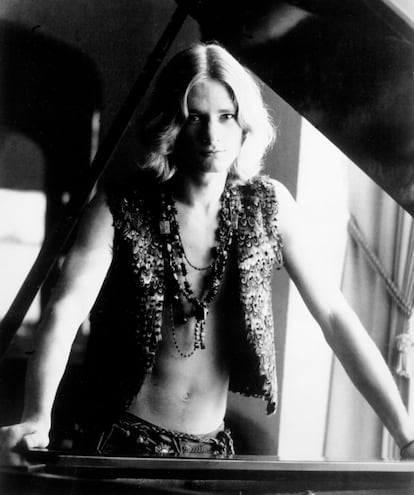
Because Jobriath, despite his anonymous death and all the years in which his legacy seemed like a distant, fading memory, was big. This may sound surprising in the times of Mika, Patrick Wolk, Rufus Wainwright, Kele Okereke, Frank Ocean and many others, but he was the first gay rocker to fully emerge from the closet, no ambiguities or well-calibrated reservations like David Bowie’s. He created a couple of valuable albums, some of the most interesting recordings that the first batch of American glam rock would yield, and he was responsible for anthems to forcefulness and exuberance such as Take Me In Yours, I’m A Man and the aforementioned Morning Starship.
He was — to paraphrase Marc Almond — a prominent songwriter, a splendid dancer, an accomplished pianist and a really good singer. Still, none of those qualities were truly appreciated because, as Dave Chiu explains in the (belated) obituary that The New York Times published just a couple of years ago, he was the protagonist of one of the most absurd, most bizarre promotional campaigns in the history of popular music, which made him the target of the hatred and scorn of the public.
Much of the blame can be attributed to Jerry Brandt, the man who “discovered” him at the end of 1972. Brandt always argued that the Jobriath that he met was a singer in a slump who had just thrown in the towel after multiple attempts to break into the music business in both New York and Los Angeles. The clever businessman, manager of pop star Carly Simon, boasted of having rescued that premature loser, then 26 years old, from destitution.
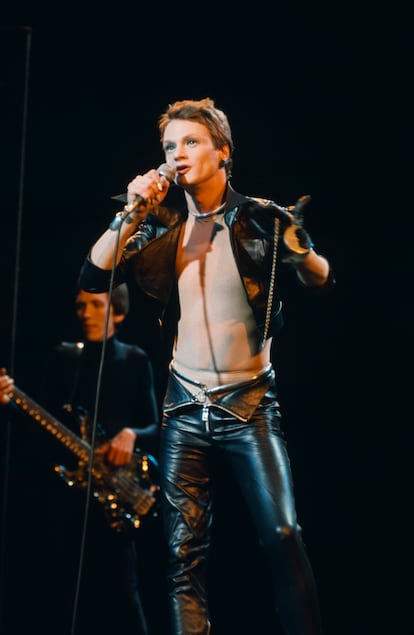
He did it almost by chance, after listening, in the office of Columbia Records executive Clive Davis, to a demo that everyone (except him) deemed “mad and unstructured and destructive to melody.” Brandt was struck by the singer’s strange falsetto, which made him picture a Mick Jagger with feminine sensitivity trying to sound like Judy Garland. As Davis was not interested in the tape, he asked him for the sender’s address and paid him a visit. In an austere apartment on the outskirts of Los Angeles, the businessman was greeted by an angelic creature dressed from head to toe in white who said his name was Jobriath Salisbury. Brandt, always prone to making smearing remarks, claimed years later that Jobriath was completely ruined and that, since he had been prostituting himself for a few months, he mistook him for a client. He corrected him and invited him to Malibu for drinks: “We have to talk about business.” “What business?” “Your music career, of course.”
The Holy Grail of star spangled glam
The white-clad creature and the visionary manager formed an instantly successful tandem. Brandt got Jobriath a contract worth approximately $50,000 a year with Elektra Records, the company that showed the most interest after a series of auditions in which the musician sang, danced, played the piano, mimed and even mimicked some of his idols, like Rudolf Nuréyev and Marlene Dietrich. Brandt insisted that the press release that was published after the agreement stated that the amount was ten times higher: $500,000 dollars in exchange for two albums in the following 12 months. That was the first of a series of white lies intended to give an aura of exceptionality to Jobriath’s career.
By then, one of the great priorities of the American recording industry was to import the British glam fever as soon as possible. In full swing since mid-1971, glam, which in the opinion of music critic Simon Reynolds was, more than a sound, a style, an aesthetic or an attitude, an attempt to add high doses of sophistication, theatricality and sexual ambiguity to the rock music aimed at the youngest audience, already had big stars like Bowie, Marc Bolan, Sweet, Slade, Gary Glitter and Roxy Music, but its only massively successful American figures continued to be Alice Cooper and the bassist and singer Suzi Quatro (the latter fronting a British band).
Brandt and Elektra saw Jobriath as the Holy Grail of American glam. If it was a matter of injecting the music with a dose of spectacularity and stage delirium, what could be better than a young man trained in variety theater who had been part of the cast of Hair, the great hippie musical of the late 1960s? As for sophistication, Jobriath exuded the nectar of bohemian extravagance from every pore. And, if it was about playing the card of sexual diversity to its ultimate consequences, why not sell the boy as the first openly gay rock star?
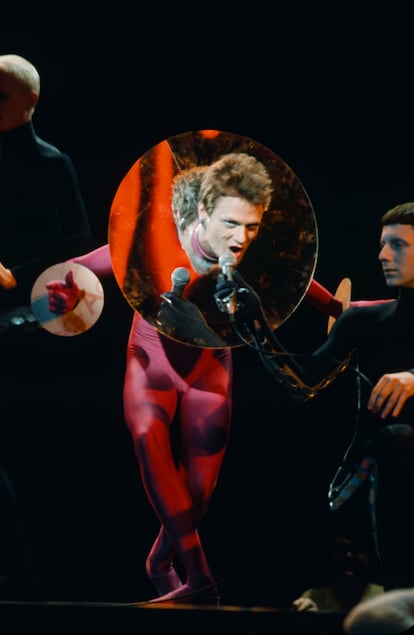
Brandt suggested that he focus especially on this last aspect. Thus, a Jobriath who in his early youth had conducted himself with a certain shyness in the interviews, put aside all inhibitions and went all out, making statements such as, “Asking me if I’m homosexual is like asking James Brown if he’s Black.” Meanwhile, his manager designed a daring promotional campaign. He made him appear on The Midnight Special, the most popular musical show on American television, dressed as a galactic swan and an avant-garde pierrot, a couple of outfits that caused a sensation among the glam elite (and which would later be imitated by Brian Eno and the Bowie from Ashes to Ashes), but which turned out to be difficult to digest for the program’s rather conservative audience.
After that, full-page advertisements began to appear in magazines such as Playboy, Vogue and Rolling Stone, presenting him as Elvis Presley’s legitimate heir, the greatest thing that had happened to rock since The Beatles broke up and the earthling who played the piano best since Sergei Prokofiev, as well, of course, as “America’s answer to David Bowie.”
A false start
This last promotional hyperbole (also by Brandt) turned out to be a double-edged sword. In the spring of 1973, when the first two singles from what was going to be Jobriath’s debut album appeared, the critics treated them with a certain leniency. More than one, however — despite the sizeable financial injection that Elektra was making into their publications — began to suggest that perhaps this was too much like David Bowie. In the United Kingdom, Marc Almond explains, a “chauvinistic and homophobic” music press (which had accepted Bowie after years of treating him with absurd condescension) began to describe Jobriath as a clumsy attempt at cultural appropriation and a crude plagiarism.
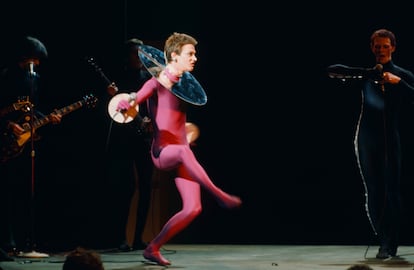
Back in the United States, the disaster that had been brewing for months climaxed with the album’s fall release. People were tired of finding this Jobriath person everywhere they looked, wrapped in annoyingly grandiloquent tinsel. Brandt would talk years later about making a multimillion-dollar investment in a product that people just did not like: “Speaking only about production costs, the album cost more than $200,000, and it must have raised, I don’t know, 50 cents? I don’t think even Jobriath’s parents bought it.”
The singer had been promised that the album was going to be the foundation stone of a great empire. At the end of October, they had booked three nights at the Paris Opera for a world premiere that was expected to feature big guest stars. A few days later a tour would take Jobriath to the places (Germany, Italy, Japan, Australia, the United Kingdom) that he had been dreaming of since he was a gay teenager and a prodigious pianist in King of Prussia, Pennsylvania, the bedroom community where he grew up. Everything was cancelled. There was no Paris Opera because it immediately became clear that selling even a third of its capacity on the first night was going to be impossible. There was no European tour because no promoter from London, Amsterdam, Milan or Berlin showed the slightest interest in signing an artist who had become the laughingstock of the business.
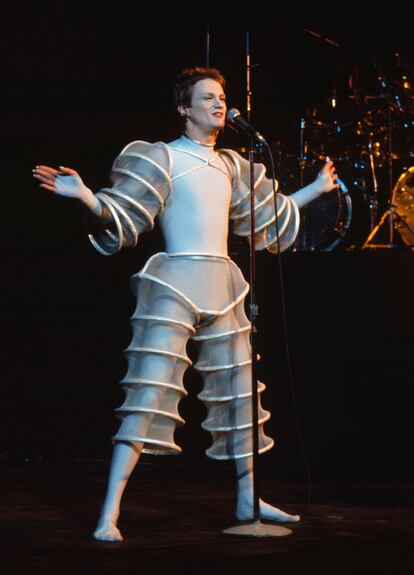
As a consolation prize, Jobriath would present his album in a club with just 400 seats in New York’s Greenwich Village. In order to fill it, they had to resort to the old trick of giving away tickets to the prettiest people they could find around the premises. According to The Village Voice, it was a strange, dull concert. Jobriath had gone from the effervescent optimism of his first singles to a certain autumnal disenchantment. His career, which seemed headed for the stars, was derailing before reaching the first turn. He would still record another album for Elektra, Creatures of the Street, a dozen songs that departed from glam orthodoxy to gracefully engage in the most outrageous Dadaist cabaret, but no one was willing to listen anymore.
The last years of his life can be seen as a landing in the real world after a 15-month foray on Mars. Also, like a long decline. Taking refuge in his Chelsea loft, Jobriath announced that he was retiring from the music business and that he would try to make his way in what he considered his territory: variety shows. He contracted AIDS at the end of 1981 and died a year and a half later. One of his last public appearances was to celebrate the anniversary of the place where he lived and to congratulate himself, while he was at it, because the ten-year contract with his discoverer, Jerry Brandt, had finally expired. He was now free to try something else in music, something that was worthwhile, without excessive expectations or interference. But he did not have time.
Sign up for our weekly newsletter to get more English-language news coverage from EL PAÍS USA Edition
Tu suscripción se está usando en otro dispositivo
¿Quieres añadir otro usuario a tu suscripción?
Si continúas leyendo en este dispositivo, no se podrá leer en el otro.
FlechaTu suscripción se está usando en otro dispositivo y solo puedes acceder a EL PAÍS desde un dispositivo a la vez.
Si quieres compartir tu cuenta, cambia tu suscripción a la modalidad Premium, así podrás añadir otro usuario. Cada uno accederá con su propia cuenta de email, lo que os permitirá personalizar vuestra experiencia en EL PAÍS.
¿Tienes una suscripción de empresa? Accede aquí para contratar más cuentas.
En el caso de no saber quién está usando tu cuenta, te recomendamos cambiar tu contraseña aquí.
Si decides continuar compartiendo tu cuenta, este mensaje se mostrará en tu dispositivo y en el de la otra persona que está usando tu cuenta de forma indefinida, afectando a tu experiencia de lectura. Puedes consultar aquí los términos y condiciones de la suscripción digital.








































